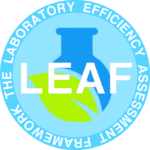Sustainable Labs
At the University of Leeds, we are committed to integrating sustainability across education, research, and operations. We have outstanding facilities that allow research to thrive. However, laboratory activity consumes around 5-10 times more energy per square meter than typical academic spaces.
As places of innovation and discovery, our laboratories play a key role in embedding sustainability across the whole institution. But there’s a real need – and opportunity – to tackle this and reduce the negative environmental effects of laboratories on campus and beyond.
Our Sustainable Labs programme aims to support staff and students to improve sustainability in labs, reducing waste, resource and energy use and embedding sustainable behaviours.
Sustainable Labs Resource Hub
Staff and Students at the University of Leeds can access our Sustainable Labs Resource Hub. Here you will find find hints, tips and guidance on a range of areas of sustainability in labs, including reducing waste, saving energy and water, avoiding single use plastics and much more.
The Sustainable Labs Resource Hub is hosted on Sharepoint and is available to all with a University of Leeds login. Staff can also join our Sustainability Community on Teams.
LEAF; Laboratory Efficiency Assessment Framework
We use LEAF, a tool developed by University College London, to help researchers, staff and students understand and improve the sustainability and efficiency of their laboratories.

LEAF contains criteria that lab users can implement around areas such as waste & recycling, equipment management, procurement, and more. The criteria are based on actions that have already been proven to work in other laboratories. A key feature of LEAF is that it allows you to quantify your impact in both financial and carbon savings.
LEAF is intended for anyone working in any of our labs, including NHS areas. It is ideal for technical staff, lab management, PhDs and post-docs with an interest in sustainability, or anyone working around laboratories.
If you would like to sign your lab up to LEAF, please sign up via our form.
Our LEAF Laboratories
Bronze
- Lukacs Lab – FBS
- Plant Growth Suite – FBS
- FS&N Research Labs - ENV
- Oral Biology - FMH
Silver
- Elton Zeqiraj Lab - FBS
- Soft Matter Physics - FEPS
- Med Chem Lab G39 - FEPS
- iPRD - FEPS
- Chemistry Teaching Labs - FEPS
- FS&N Teaching Labs - ENV
Gold
- Bioimaging and Flow Cytometry Facility - FBS
- PIXC - FBS
- Electron Microscopy Facility - FBS
In development
- Animal Sciences Group - FBS
- Beatrice Filippi Lab - FBS
- Davies Lab - FBS
- Plant Nematology Group - FBS
- The Environmental Variation Group - FBS
- Membrane Group - FBS
- Mass Spectrometry Facility - FBS
- NMR Facility – FBS
- O'Neill Lab - FBS
- Radford/Brockwell/Calabrese - FBS
- CAPE Analytical Facilities - FEPS
- ChemLab 1.49 – FEPS
- Engineering Teaching Lab - FEPS
- MNP/BioNano – FEPS
- MULTIForm Facility, G.03.a - FEPS
- Geography Labs - ENV
- Flow Cytometry and BioImaging - FMH
- LIMR - FMH
Blogs
Ashley talks sustainable labs and single use plastics
Last year I began my role as a Student Sustainability Architect, where I was tasked with exploring the use of single-use plastics (SUPs) in laboratories...
Choose to reuse - alternatives to single use plastic
Perhaps you carry a refillable water bottle in your bag, pack your shopping into reusable bags at the supermarket, or nab a discount for using...
The Big Plastic Count on Campus - what happens next?
In May 2022 the Big Plastic Count came to the University of Leeds, and we asked students and staff to report the single-use plastic that...
News
Sustainable Labs On Tour
The Sustainable Labs programme is launching a roadshow tour of campus in January and February 2024 to promote engagement with sustainability in labs across the...
Labs awarded Silver and Gold LEAF awards
Congratulations to the five University labs that have improved their LEAF status after an audit this summer! The Electron Microscopy Facility has moved to...
First Gold LEAF accreditation awarded to PIXC lab
Congratulations to the PIXC Research Facility in the Faculty of Biological Sciences for achieving the first Gold LEAF accreditation at the University of Leeds! LEAF...
United Nations Sustainable Development Goals
We use the United Nations Sustainable Development Goals (SDGs) as a framework to guide our activity. Our sustainable labs work is linked to the following SDGs:
- Goal 7: Affordable and clean energy
- Goal 9: Industry, innovation and infrastructure
- Goal 12: Responsible consumption and production
Find out more about our impact on the SDGs.
